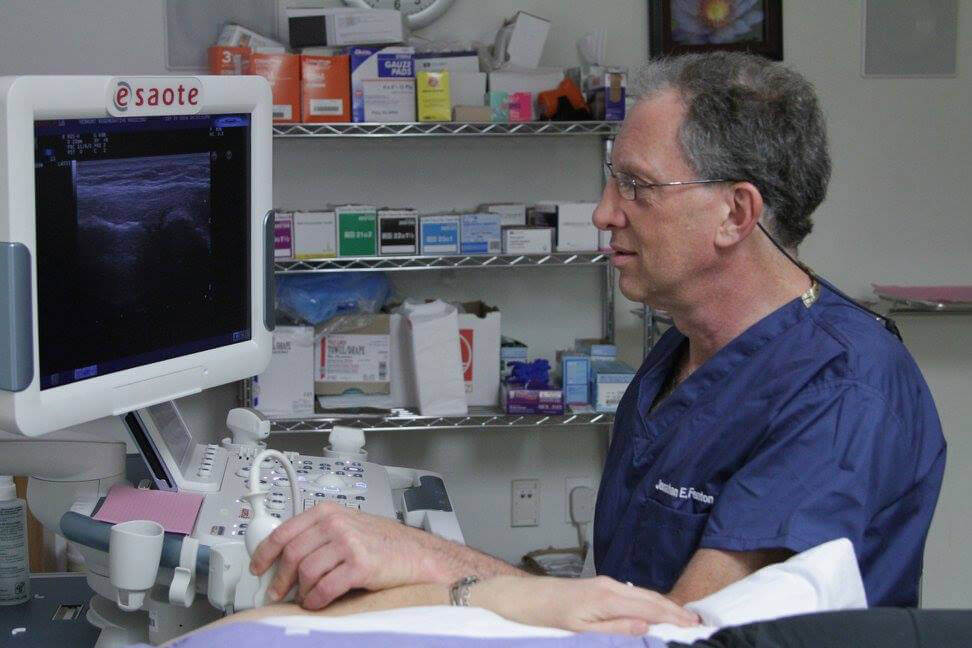Meet Visiting Physician, Dr. Jonathan Fenton.
Regenexx Cayman has thirteen visiting physicians. They are U.S. board certified and licensed to practice in the Cayman Islands. Our physicians are leaders in the field of regenerative medicine.
This blog is the first of a series of posts, each featuring a different Regenexx Cayman doctor to learn more about their practice and medical background.

Introducing Dr. Jonathan Fenton, from Vermont Regenerative Medicine. Dr. Fenton is board certified in Physical Medicine and Rehabilitation, Neuromusculoskeletal Medicine and Osteopathic Manipulation, Diagnostic Musculoskeletal Sonography, and Orthopedic Medicine. Hailing from Winooski in northwestern Vermont, Dr. Fenton is an avid bicyclist and alpine skier, as well as a former professional ski instructor.
Why did you decide to specialize in interventional orthopedics?
Dr. Fenton: I was involved with orthopedic biomechanics since my first year of college. It was when I was in medical school that I realized I could help more people and treat more conditions successfully by practicing orthopedic medicine non-surgically.
What do you find most rewarding about your job?
Dr. Fenton: I typically see two new patients a day for 60 to 75 minutes each. I do ultrasound guided regenerative injections on four or five patients a day. In addition, I treat one to two patients with osteopathic manipulation. Of course, then there is the review of MRIs, finishing notes for the day, and answering patient’s emails and phone calls.
What is your typical patient like?
Dr. Fenton: My typical patient is between 50 to 70 years old, with an active to athletic background. Their common conditions include knee, hip, shoulder, or back pain.
In your opinion, which patients have the best outcomes from Regenexx Cayman’s exclusive Regenexx-C procedure?
Dr. Fenton: Patients with the goal of improved function and higher activity levels. Patients desiring more than just pain relief. The best candidates usually have multiple joint conditions or a combination of joint and spine conditions that are really limiting their activities.
Regenexx leads the world’s research on stem cell orthopedic treatments, are you currently involved in any research projects or what areas of research are you most interested in?
Dr. Fenton: I have done extensive clinical research on hip problems. My work has improved methods and outcomes for Regenexx hip patients. I am also interested in the causes and treatment of patients with excess effusions (fluid) in their joints.
How do you keep work life balance?
Dr. Fenton: At home in Vermont it is a struggle. I am always home for dinner. I make sure to go outside to exercise twice a day, regardless of the weather (it is nine degrees and windy here, with snow and ice on the ground!). My best method is coming to Cayman four to five times a year! I make sure to walk on the beach and go in the clear ocean twice a day.
As a Regenexx Cayman visiting physician, what do you enjoy most about your time on island?
Dr. Fenton: Walking on Seven Mile Beach and swimming back! I also love the great comradery and humor of the Regenexx Cayman staff.
In your opinion, what is one of the biggest challenges facing health care today?
Dr. Fenton: Industrialization and corporatizing of medicine. It is reducing real doctor-patient interactions and lowering satisfaction for both the patient and the health care provider.
What do you envision for the future of interventional orthopedic stem cell treatments?
Dr. Fenton: Having it more widely known and used, so that patients can be diagnosed and treated earlier in their disease progression for better and longer lasting outcomes.